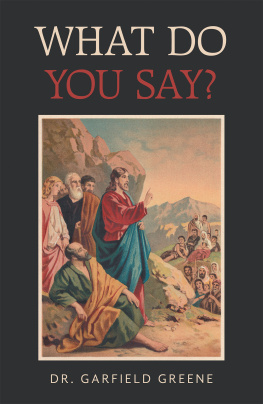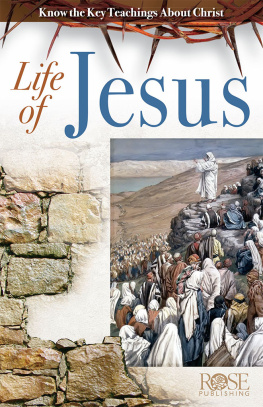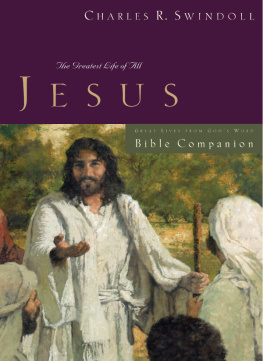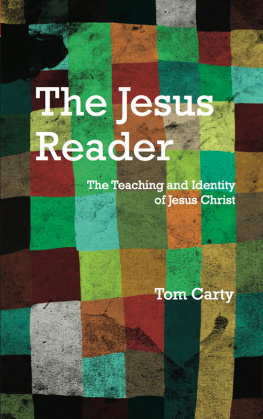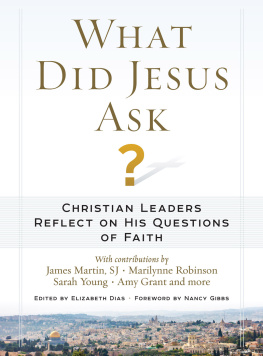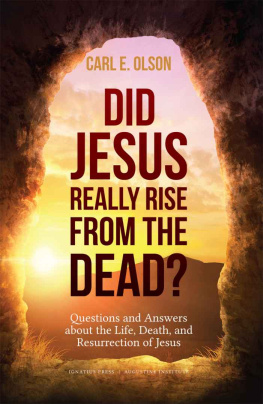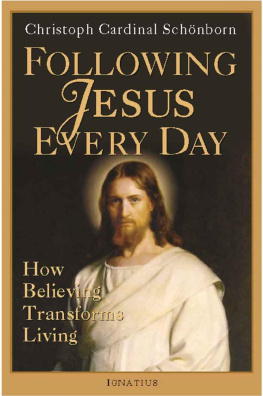WHAT DO
YOU SAY?
DR. GARFIELD GREENE
Copyright 2021 by Dr. Garfield Greene.
Library of Congress Control Number: | 2021914997 |
ISBN: | Hardcover | 978-1-6641-8148-9 |
Softcover | 978-1-6641-8147-2 |
eBook | 978-1-6641-8146-5 |
All rights reserved. No part of this book may be reproduced or transmitted in any form or by any means, electronic or mechanical, including photocopying, recording, or by any information storage and retrieval system, without permission in writing from the copyright owner.
Scripture quotations marked NIV are taken from the Holy Bible, New International Version. NIV. Copyright 1973, 1978, 1984 by International Bible Society. Used by permission of Zondervan. All rights reserved. [Biblica]
Any people depicted in stock imagery provided by Getty Images are models, and such images are being used for illustrative purposes only.
Certain stock imagery Getty Images.
Rev. date: 07/29/2021
Xlibris
844-714-8691
www.Xlibris.com
831866
This book is dedicated to my wife,
Deaconess Margie Greene
CONTENTS
This book is about Jesus of Nazareth, who is also called Jesus Christ or Jesus of Galilee. My purpose for writing it is to inform readers about the person and work of the central figure of my faith to encourage and strengthen Christian believers and to challenge everyone to seek a more profound knowledge of the Bible.
The majority of the people living in the world today believe in something or someone of a higher power. Recent research says that there are five billion people who believe in a higher power. Six of the religions that have followers all around the world are Christianity, Islam, Judaism, Hinduism, Buddhism, and Confucianism. Some of those religions are monotheistic, which involves the belief in only one god or one higher power. There is also polytheism, which involves belief in many or more than one god. Those six major religions of today have a lot in common, and they have their differences, making their religions unique.
Christianity with roots in Judaism is today the most widespread religion in the world. But Christianity, as I will further explain later, is not merely a religion but a relationship. It is a relationship with the living God in the person of Jesus Christ.
Jesus, the central figure of Christianity, was of humble birth. At the very beginning of his career, Jesus rejected the temptation to try and carry out his ministry by political means. In his life, he performed many miracles, but he always did so to meet an emergent human need. He did not display his power just to call attention to himself or to prove his divine commission. As a matter of fact, Jesus often told people not to tell that he had healed them. He had a brief public career, which lasted approximately three years. He did not write any books, and there have been no great monuments erected in his honor. He did not form any organization to perpetuate his theology. He did gather about himself a group of close followers known in history as the twelve disciples, which he also called apostles. Christians believe that he entrusted to them strong spiritual powers that he intended to be transmitted by them in continuing succession. It seems that Jesus did not teach systematically, but he spoke as the situation warranted, such as at dinner parties, to a woman of dubious reputation when he happened to meet her at a well, to a stranger who wanted him to intervene in a family dispute, and to some who wanted to join themselves to him and were told so forcefully of the requirements that they were discouraged and turned back. He died in public disgrace, which made his ministry seem pointless.
We must admit that our knowledge of Jesus is limited, but we can know him and his teachings as well as we can know any figure from the ancient past, especially in the period before the Middle Ages. He made such a great impression upon his disciples that they put into written form their memories of him, his characteristics, and his work, and they put into written form detailed records that enable us to have a vivid picture of him.
Jesus was born in a manger in Bethlehem. He grew up in a humble family in the village of Nazareth. We dont know much about his childhood or his early life in general until he was about thirty years old. It was then that he began his public career.
The Roman Empire had not long been established. We are all familiar with the Christmas story that Jesus was born during the rule of the first Roman emperor, Augustus Caesar.
Jesuss public ministry began when his cousin John the Baptist appeared on the scene. He literally started a religious movement. He preached about sin in the people around him. He preached about a coming judgment where the righteous would be rewarded and the wicked would be destroyed. He urged people to repent and confess their sins. Those who repented and confessed their sins he baptized. So Jesus came to John to be baptized, but not for his sins but as a public statement initiating his ministry. Jesus, the sinless Son of God, took upon himself the sins of the whole human race. Just as he didnt have to die, he didnt have to be baptized, but he did it for us all.
Not long after he had been baptized, Jesus began preaching and teaching. He believed that the kingdom of God was about to be established, and it constituted the recurrent theme in his message. The people were expecting a political kingdom where the Jewish nation would rule the world under their Messiah.
One of the people who shared that notion was Herod. For that reason, he tried to destroy the child Jesus.
John the Baptist shared the same notion as the others, and when Jesus gave no indication that he would be that type of leader, he began to doubt whether Jesus was the Messiah after all. In Matthew 11:3, John sent a message to Jesus saying, Are you the one who was to come, or should we look for another?
What kind of kingdom did Jesus come to establish? He did not come to establish a political kingdom, but Gods reign in the hearts of people that would control and transfer their lives. The human heart is the realm in which Jesus came to reign. He came for all humankind to love him, and so he came to change us into his own image. Out of an affection for Jesus, devotion to him, and adoration of him would grow all the beauty and comfort of life, the transformation of character; the regeneration of the soul.
I am grateful to God for the inspiration and the opportunity to write.
To family members and friends for their prayers and encouragement.
The unique privilege and the responsibilities of being a senior pastor in a major religious denomination in the United States have been for me a source of many experiencespractical, social, spiritual, and theological. With those experiences have come challenges, disagreements, much soul-searching, joys, and sorrows as well as achievements and some disappointments.
A friend once said jokingly, I know you have plenty of time since you only work for one hour, and that is on Sunday morning. As strange as it may seem, there are more than a few people who actually believe that one hour on Sundays is all that we do as pastors. Let me tell you! It is not like that at all!
I was ordained to the ministry of Word, Sacrament, Order, and Service in the United Methodist Church.
The responsibilities of the ordained elder in the United Methodist Church, which are quite extensive and include religious instruction and care of the entire congregation and church community, are spelled out in detail in the 2016 edition of the United Methodist Church Book of Discipline .

Next page
